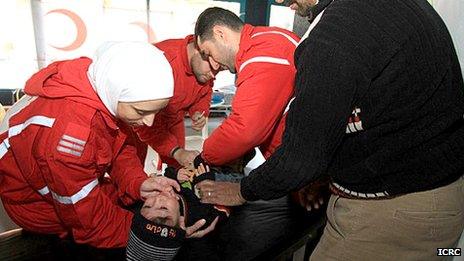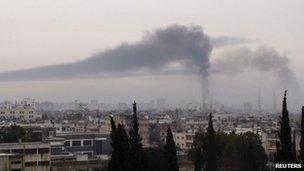Syria crisis: Red Cross presses for humanitarian truce
- Published

The Red Cross is the only international aid agency working in Syria
The International Committee of the Red Cross says it is in talks with "all those concerned" in Syria's conflict to negotiate a ceasefire.
The group says it wants to negotiate a brief truce in the most affected areas to allow it to deliver aid packages.
Correspondents say the fact that the ICRC has spoken publicly about the negotiations shows just how concerned it is by the situation in Syria.
Thousands have died there in an 11-month uprising against the government.
ICRC spokesman Bijan Farnoudi said the group was "discussing several possibilities" to enable humanitarian aid to be delivered.
He said the aim of the discussions was "to facilitate swift Syrian Arab Red Crescent and ICRC access to the people in need".
"The content of the discussions we are having with the Syrian authorities and all those involved in the fighting remains bilateral and confidential," he added.
The Red Cross indicated that any such ceasefire would probably be only for a limited period, possibly only a few hours.

Homs has been repeatedly shelled by government forces
The ICRC has been delivering food and medicine to civilians in Syria since the start of the uprising against President Bashar al-Assad.
It is the only international aid agency operating inside the country, but it has had difficulty reaching the areas badly affected by the conflict.
The BBC's Imogen Foulkes in Geneva, where the ICRC is based, says it is very unusual for the organisation to discuss any talks it might be having with participants in an armed conflict.
Russian talks
Following a visit at the weekend by China's Deputy Foreign Minister Zhai Jun, Mr Assad hosted prominent Russian politician Alexei Pushkov on Monday in Damascus.
Syria's Sana state news agency said Mr Assad had thanked Mr Pushkov for Russia's support, repeating his insistence that his country is tackling "armed terrorist groups receiving funding and arms from foreign parties, aiming to destabilise Syria".
Mr Pushkov had stressed the need for all parties to "to continue working for a political solution to the crisis based on dialogue between all concerned parties, without foreign intervention", Sana reported.
After Mr Zhai's visit, the official newspaper of the Chinese Communist Party accused the West of provoking a civil war in Syria.
Russia and China have both refused to join the growing international condemnation of Mr Assad's regime. Both countries vetoed a resolution in the UN Security Council condemning the violence and voted against a similar General Assembly resolution, saying they amounted to forced regime change.
However, Arab League Secretary-General Nabil Elaraby said on Monday there were "indications coming from China and to some extent from Russia that there may be a change in position", without giving further details.
'Awaiting death'
The London-based Syrian Observatory for Human Rights said 16 people people were killed across the country on Monday. Nine of them - including three children in one family - died in renewed shelling of the city of Homs, they said.
Activists say government forces are being reinforced around Homs, and they fear that a ground assault on the city is planned.
Hadi Abdallah, an activist in Homs, has called for women and children to flee from the heavily bombarded area of Baba Amr.
He told the AFP news agency that residents of the suburb were living in cold and "unsustainable" conditions, and that they were "awaiting death".
Another activist told the Associated Press that government forces would face stiff opposition in Homs and the residents would fight until "the last person".
Mr Assad is pressing ahead with his plan to hold a referendum on Sunday on a new constitution for Syria. The vote has been dismissed as "farcical" by the US and others.
Opposition groups have called on Syrians to boycott the referendum. Omar Idilbi, a Beirut-based member of the main opposition movement the Syrian National Council (SNC), said it "cannot be held while parts of Syria are a war zone".
Human rights groups believe more than 7,000 people have been killed since the uprising began.
The Syrian government says at least 2,000 members of the security forces have died fighting militants.
Syria restricts access to foreign media and it is not possible to verify casualty figures.
- Published25 January 2012